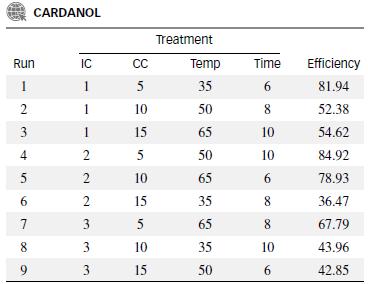Chemical modification of natural rubber is used to increase the rubbers resistance to weathering. Cardanol, an agricultural
Question:
Chemical modification of natural rubber is used to increase the rubber’s resistance to weathering. Cardanol, an agricultural byproduct of the cashew industry, is often grafted onto natural rubber for this purpose. Chemical engineers investigated a new method of grafting cardanol onto natural rubber and reported the results in Industrial & Engineering Chemical Research (May 1, 2013). An experiment was designed to assess the effect of four factors on grafting efficiency (measured as a percentage). The four factors and their levels are: Initiator concentration (IC)—1, 2, or 3 parts per hundred rubber (phr); Cardanol concentration (CC)—5, 10, or 15 phr; Reaction temperature—35, 50, or 65 ºC; and, Reaction time—6, 8, or 10 hours.
a. Consider a full 3 × 3 × 3 × 3 factorial design. How many treatments are investigated in this design? List them.
b. Give the equation of the complete model required to conduct the 3 * 3 × 3 × 3 factorial ANOVA.
c. Construct a partial ANOVA table for this design, giving the sources of variation and associated degrees of freedom. Assume that the experiment has 2 replications.
d. The researchers, with limited resources, did not run a full factorial. Rather, they ran an orthogonal fractional factorial design with a single replication that required only 9 treatments (runs). These treatments and associated responses (grafting efficiencies) are shown in the accompanying table. With this design, is it possible to investigate all factor interactions?
e. Use the regression approach to fit a main effects only model to the data. Which factors appear to have an effect on mean grafting efficiency?

Step by Step Answer:

Statistics For Engineering And The Sciences
ISBN: 9781498728850
6th Edition
Authors: William M. Mendenhall, Terry L. Sincich





